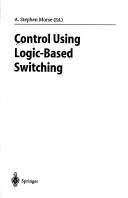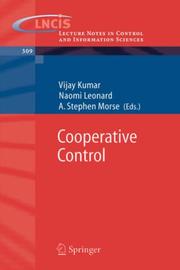| Listing 1 - 5 of 5 |
Sort by
|

ISBN: 3540760970 Year: 1997 Publisher: London : Springer,
Abstract | Keywords | Export | Availability | Bookmark
 Loading...
Loading...Choose an application
- Reference Manager
- EndNote
- RefWorks (Direct export to RefWorks)
Automatic control. --- Logic circuits. --- Switching circuits. --- Theorie du controle

ISBN: 3540315950 3540228616 Year: 2005 Publisher: Berlin, Heidelberg : Springer Berlin Heidelberg : Imprint: Springer,
Abstract | Keywords | Export | Availability | Bookmark
 Loading...
Loading...Choose an application
- Reference Manager
- EndNote
- RefWorks (Direct export to RefWorks)
Are there universal principles of coordinated group motion and if so what might they be? This carefully edited book presents how natural groupings such as fish schools, bird flocks, deer herds etc. coordinate themselves and move so flawlessly, often without an apparent leader or any form of centralized control. It shows how the underlying principles of cooperative control may be used for groups of mobile autonomous agents to help enable a large group of autonomous robotic vehicles in the air, on land or sea or underwater, to collectively accomplish useful tasks such as distributed, adaptive scientific data gathering, search and rescue, or reconnaissance.
Engineering. --- Artificial intelligence. --- System theory. --- Vibration. --- Dynamical systems. --- Dynamics. --- Automotive engineering. --- Control engineering. --- Robotics. --- Mechatronics. --- Control. --- Vibration, Dynamical Systems, Control. --- Systems Theory, Control. --- Control, Robotics, Mechatronics. --- Artificial Intelligence (incl. Robotics). --- Automotive Engineering. --- Cycles --- Mechanics --- Sound --- AI (Artificial intelligence) --- Artificial thinking --- Electronic brains --- Intellectronics --- Intelligence, Artificial --- Intelligent machines --- Machine intelligence --- Thinking, Artificial --- Bionics --- Cognitive science --- Digital computer simulation --- Electronic data processing --- Logic machines --- Machine theory --- Self-organizing systems --- Simulation methods --- Fifth generation computers --- Neural computers --- Construction --- Industrial arts --- Technology --- Mechanical engineering --- Microelectronics --- Microelectromechanical systems --- Automation --- Control engineering --- Control equipment --- Control theory --- Engineering instruments --- Programmable controllers --- Dynamical systems --- Kinetics --- Mathematics --- Mechanics, Analytic --- Force and energy --- Physics --- Statics --- Systems, Theory of --- Systems science --- Science --- Philosophy --- Systems theory. --- Control and Systems Theory. --- Artificial Intelligence. --- Automatic control.
Book
ISBN: 9783540315957 Year: 2005 Publisher: Berlin Heidelberg Springer Berlin Heidelberg
Abstract | Keywords | Export | Availability | Bookmark
 Loading...
Loading...Choose an application
- Reference Manager
- EndNote
- RefWorks (Direct export to RefWorks)
Are there universal principles of coordinated group motion and if so what might they be? This carefully edited book presents how natural groupings such as fish schools, bird flocks, deer herds etc. coordinate themselves and move so flawlessly, often without an apparent leader or any form of centralized control. It shows how the underlying principles of cooperative control may be used for groups of mobile autonomous agents to help enable a large group of autonomous robotic vehicles in the air, on land or sea or underwater, to collectively accomplish useful tasks such as distributed, adaptive scientific data gathering, search and rescue, or reconnaissance.
Classical mechanics. Field theory --- Applied physical engineering --- Transport engineering --- Engineering sciences. Technology --- Artificial intelligence. Robotics. Simulation. Graphics --- Computer. Automation --- procesautomatisering --- automatisering --- systeemtheorie --- transport --- KI (kunstmatige intelligentie) --- systeembeheer --- robots --- dynamica --- regeltechniek
Digital

ISBN: 9783540776536 Year: 2008 Publisher: Berlin, Heidelberg Springer-Verlag Berlin Heidelberg
Abstract | Keywords | Export | Availability | Bookmark
 Loading...
Loading...Choose an application
- Reference Manager
- EndNote
- RefWorks (Direct export to RefWorks)
Book

ISBN: 9783540776536 Year: 2008 Publisher: Berlin Heidelberg Springer Berlin Heidelberg
Abstract | Keywords | Export | Availability | Bookmark
 Loading...
Loading...Choose an application
- Reference Manager
- EndNote
- RefWorks (Direct export to RefWorks)
The lectures gathered in this volume present some of the different aspects of Mathematical Control Theory. Adopting the point of view of Geometric Control Theory and of Nonlinear Control Theory, the lectures focus on some aspects of the Optimization and Control of nonlinear, not necessarily smooth, dynamical systems. Specifically, three of the five lectures discuss respectively: logic-based switching control, sliding mode control and the input to the state stability paradigm for the control and stability of nonlinear systems. The remaining two lectures are devoted to Optimal Control: one investigates the connections between Optimal Control Theory, Dynamical Systems and Differential Geometry, while the second presents a very general version, in a non-smooth context, of the Pontryagin Maximum Principle. The arguments of the whole volume are self-contained and are directed to everyone working in Control Theory. They offer a sound presentation of the methods employed in the control and optimization of nonlinear dynamical systems.
| Listing 1 - 5 of 5 |
Sort by
|

 Search
Search Feedback
Feedback About UniCat
About UniCat  Help
Help News
News